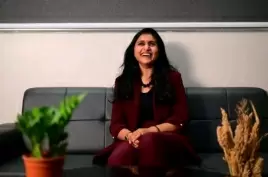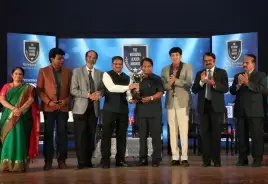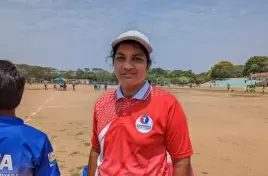An oasis in the desert of women’s illiteracy

10-August-2012
Vol 3 | Issue 32
Early mornings in Heena's home are usually busy. The eight-year-old is frantically finishing up her homework even as her more diligent elder sister, Seema, 14, eggs her on and guides her when she gets stuck with the tough questions. After this, the sisters get ready and head for their school close by.
Outside their thatched-roofed pucca home, there's hectic activity going on as a gaggle of girls – all 15 to 17 year olds – makes their way to the bus stop on National Highway No. 15, from where they have to hop on to a bus that will drop them off at the higher secondary school some nine kilometres away.
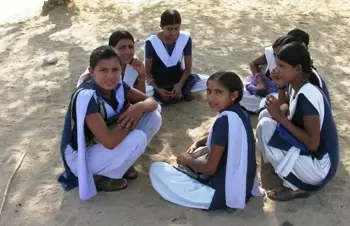 |
|
In Hathitala it's a crime not to send a daughter to school (Photos: Rekha Pal/ WFS)
|
This is how a typical day for young girls in Hathitala in western Rajasthan, unfolds. Unlike the rest of the state where, daughters are generally ignored and neglected, in this gram panchayat, 25 kilometres away from Barmer city, right in the heart of the Thar desert, it's a crime not to send a daughter to school.
Deep-rooted social prejudices and discriminative practices have ensured that Rajasthan today has some of the worst social indicators, where girls and women are concerned.
As per Census 2011, the state has hit a new low in child sex ratio, which has gone down to 883 girls per 1000 boys – a shocking drop of 33 points since 1991. The female literacy rate has grown only by nine per cent – it's 52 per cent now from 43 per cent in 2001 – the lowest growth rate in the country.
Moreover, one in every three school-going girls drops out as they are married off early. In fact, the Demographic Health Survey data indicates that Rajasthan has 68 per cent girls marrying before they turn 18.
Barmer district, where Hathitala is located, has been positively unfair in its treatment to girls: Already infamous for having been a hotbed for female infanticide, the average literacy rate here as per Census 2011 is 57.49 per cent compared to 58.99 in 2001. The female literacy rate is a dismal – 41.03 per cent, down from 43.45 in 2001.
Hathitala's attitude towards its daughters, therefore, would appear rather extraordinary, making Heena, Seema, Sunita and their friends very fortunate to be living here.
Of course, while the child marriage tradition is still being followed, at least the gram panchayat has the unique distinction of sending all of its 600 girls to school, something that is unheard of in Rajasthan.
This is not a new development in the village. The rule that makes it mandatory for girls to attend school was put into force in 1991 by then panchayat members Gangaram Sai and Bhanwar Singh, and some other visionary village elders, who had themselves gone to school and understood the importance of education for everybody, especially girls.
It also helps that the current sarpanch, Laali Devi, has also ensured that no family violates this rule.
Yogesh Beniwal, Laali Devi's son, elaborates on how the compulsory schooling is working out for Hathitala. He says, "Although there are penalties and fines on non-compliance of the rule, nobody has been fined till now as every family here believes in getting their daughters educated."
Adds Gangaram Sai, one of the prime movers of this initiative, "These days there is a sort of competition among the families to send their girls to school. Likewise, the girls are also doing well and making their parents proud. Over the years, many of them have become teachers, auxiliary nurses, constables in the police and also national kho-kho players. So nobody ever thinks of letting their daughter stay back at home here."
Another village elder puts in, "Parh likh jayengi to naukri lag jayegi aur zindagi sudhar jayegi (Education will provide them jobs which will improve the standards of their life.)"
But an enlightened outlook was not always there. Until about 20 years ago, like in the rest of state, the girls in Hathitala, too, were not allowed to attend school.
Once the village elders had made up their mind to change things, the process of transformation began, albeit very slowly. To stir things along, it was decided that a fine would be imposed. There is an unwritten rule that reluctant families would be imposed a penalty of crop and cash, as per their financial status, and would also have to face social exclusion.
At the Rajkiya Uchch Prathmik Vidyalaya, a co-educational school till Class Eight, Babulal has been witness to the changing times over his 17 year teaching career. He says, "Slowly I noticed that parents were keen that their daughters study well, which was initially quite surprising for me. Parents now want their girls to have a career like the boys."
It's the mothers of Hathitala, who have hastened the pace of change. They no longer want their daughters to undergo the same traumas they did because of their illiteracy and early marriages.
Today they aggressively guard their daughter’s right to education. Take Seema's mother, Munni Devi. Due to poverty, the little girl may be compelled to go and work in the fields but her mother ensures that she never misses school. "I do work in the field but have been going to school for the past nine years. I can read, write and help my younger siblings as well," says Seema shyly.
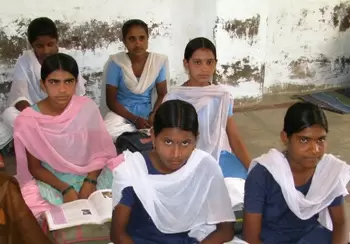 |
Her mother adds, "Our village is unique. I feel blessed that both my daughters have been able to join school. They will be better informed about their health and would be able to handle their life better when they get married."
Another mother, Harkhu Devi is proud of her daughter Panni, who is a now a constable with the Hadi Rani Battalion and is posted in Jodhpur. Incidentally, this is the country's first all-women battalion.
All she now wants is for all the girls in her extended family go to school too. She says, "We were never sent to school. We did housework and grazed cattle all day. Today, I feel we must educate all children, the girls just as much the boys."
Talk to the girls of Hathitala and most say: "Both our parents and in-laws understand the power of education. They know girls often outshine boys in exams and even become economically independent."
Sunita, 17, adds, "Thankfully, nobody objects even if we travel in bus to the school some distance away. But we prefer to move in groups. After all, there are still some prejudices left in our social system."
Today, where other Rajasthani girls can only dream of sitting in a classroom, Sunita and her friends are studying Economics, Maths and Hindi and hoping to work in the city one day.
For Rajasthan, there is hope in a small and remote village like Hathitala, which has lit up the lives of its girls through compulsory schooling and allowed them to dream of touching the sky. - Women's Feature Service



